Tax Treatments and Implications for Foreigners Investing in Agricultural Businesses in Australia
VerifiedAdded on 2023/03/20
|12
|2907
|86
AI Summary
This article discusses the tax treatments and implications for foreigners investing in agricultural businesses in Australia. It covers the rules and regulations surrounding international taxation, residency status, and tax obligations for foreign residents. The article also explores the foreign investment policy and the approval process for investing in Australian agricultural land. Additionally, it highlights the tax challenges faced by foreign investors and the potential impact of land tax on their investment decisions.
Contribute Materials
Your contribution can guide someone’s learning journey. Share your
documents today.
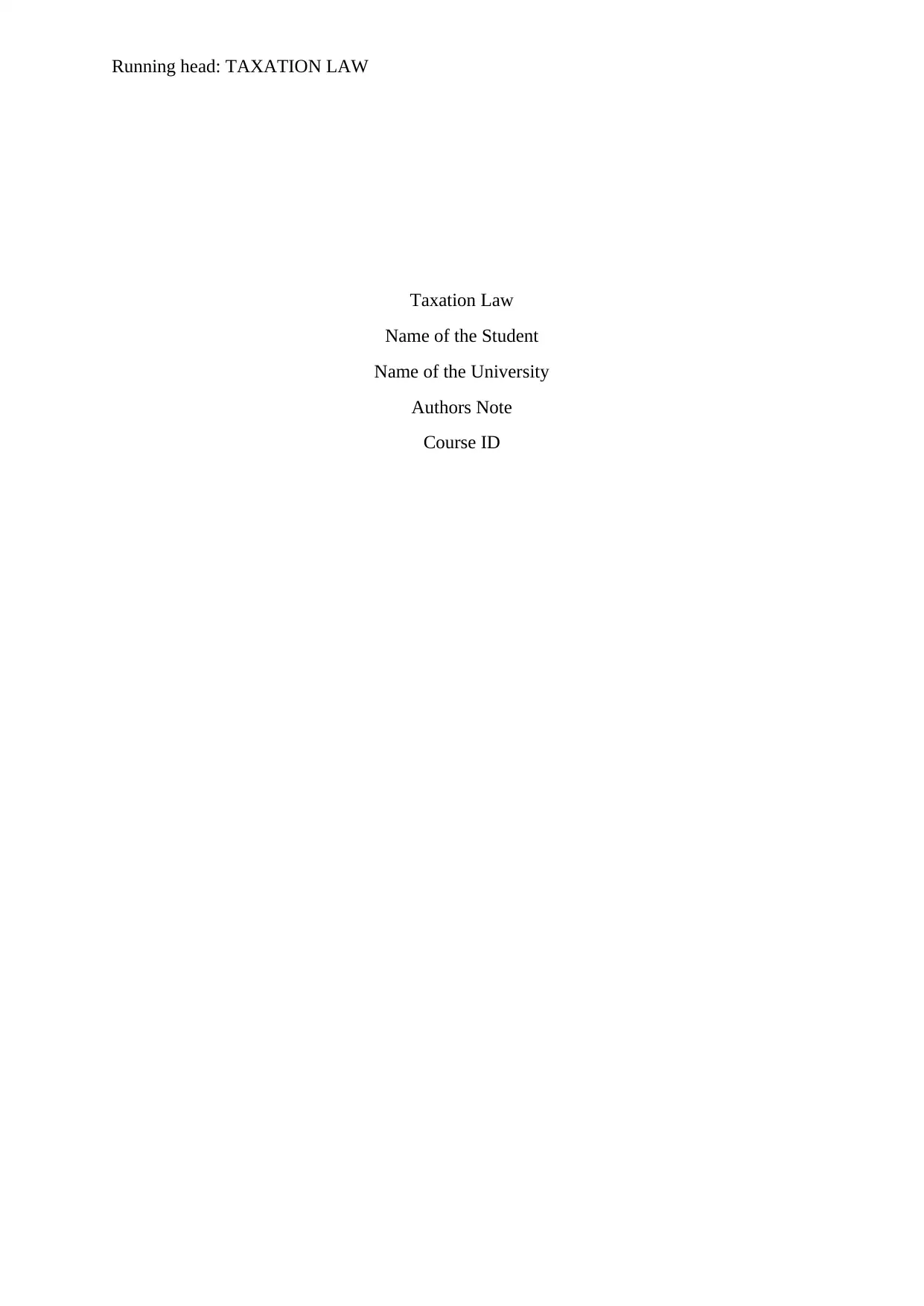
Running head: TAXATION LAW
Taxation Law
Name of the Student
Name of the University
Authors Note
Course ID
Taxation Law
Name of the Student
Name of the University
Authors Note
Course ID
Secure Best Marks with AI Grader
Need help grading? Try our AI Grader for instant feedback on your assignments.
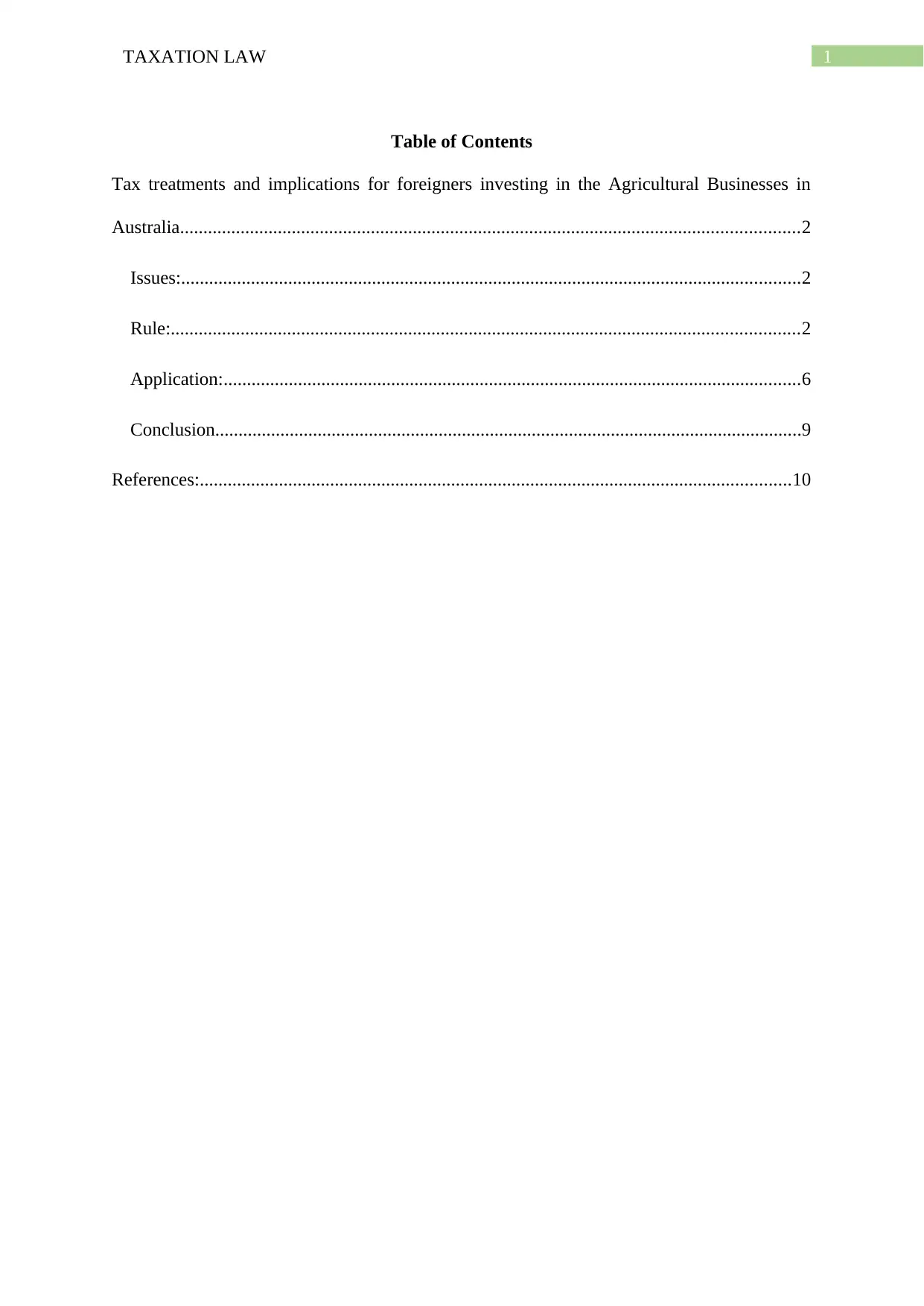
1TAXATION LAW
Table of Contents
Tax treatments and implications for foreigners investing in the Agricultural Businesses in
Australia.....................................................................................................................................2
Issues:.....................................................................................................................................2
Rule:.......................................................................................................................................2
Application:............................................................................................................................6
Conclusion..............................................................................................................................9
References:...............................................................................................................................10
Table of Contents
Tax treatments and implications for foreigners investing in the Agricultural Businesses in
Australia.....................................................................................................................................2
Issues:.....................................................................................................................................2
Rule:.......................................................................................................................................2
Application:............................................................................................................................6
Conclusion..............................................................................................................................9
References:...............................................................................................................................10
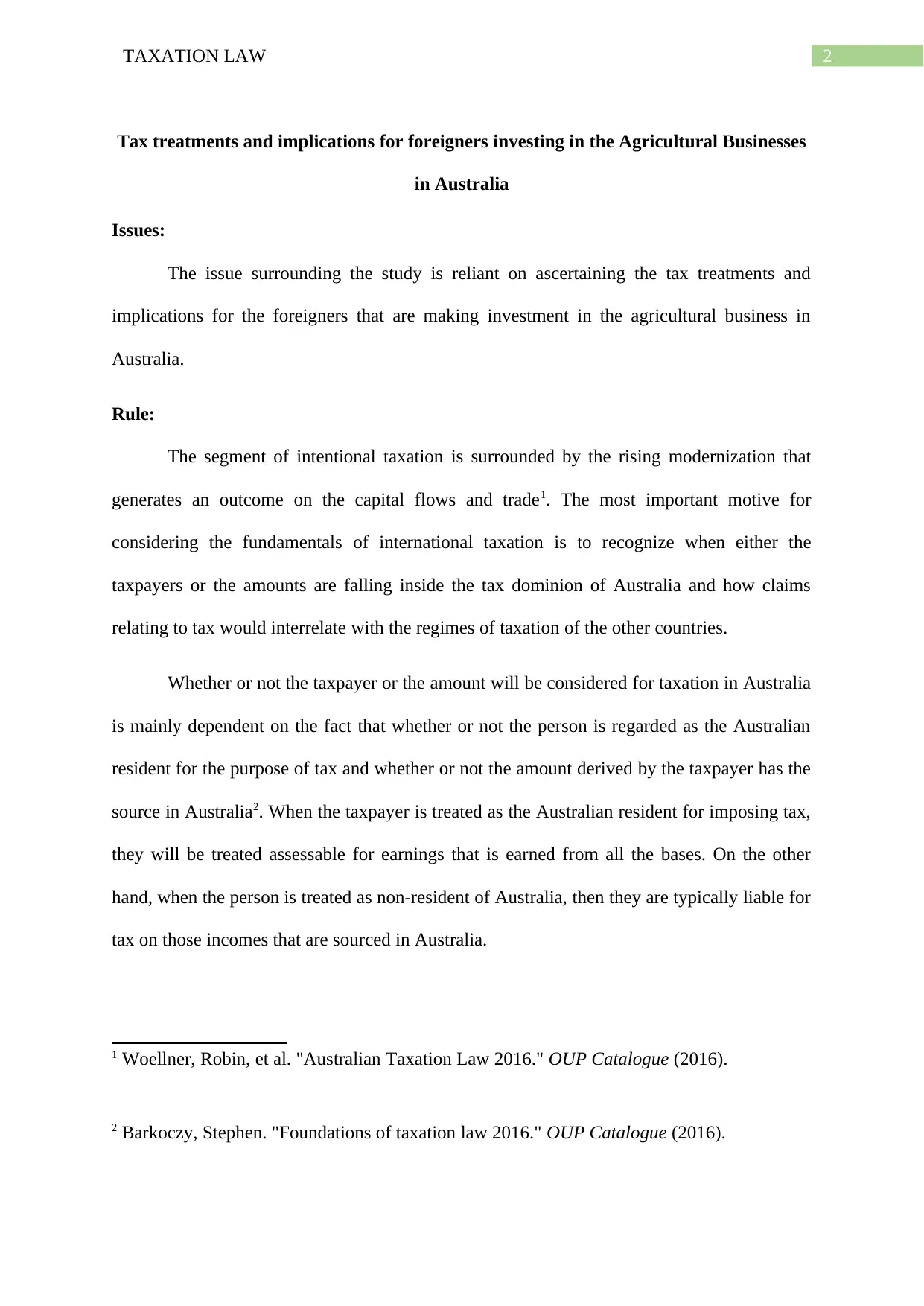
2TAXATION LAW
Tax treatments and implications for foreigners investing in the Agricultural Businesses
in Australia
Issues:
The issue surrounding the study is reliant on ascertaining the tax treatments and
implications for the foreigners that are making investment in the agricultural business in
Australia.
Rule:
The segment of intentional taxation is surrounded by the rising modernization that
generates an outcome on the capital flows and trade1. The most important motive for
considering the fundamentals of international taxation is to recognize when either the
taxpayers or the amounts are falling inside the tax dominion of Australia and how claims
relating to tax would interrelate with the regimes of taxation of the other countries.
Whether or not the taxpayer or the amount will be considered for taxation in Australia
is mainly dependent on the fact that whether or not the person is regarded as the Australian
resident for the purpose of tax and whether or not the amount derived by the taxpayer has the
source in Australia2. When the taxpayer is treated as the Australian resident for imposing tax,
they will be treated assessable for earnings that is earned from all the bases. On the other
hand, when the person is treated as non-resident of Australia, then they are typically liable for
tax on those incomes that are sourced in Australia.
1 Woellner, Robin, et al. "Australian Taxation Law 2016." OUP Catalogue (2016).
2 Barkoczy, Stephen. "Foundations of taxation law 2016." OUP Catalogue (2016).
Tax treatments and implications for foreigners investing in the Agricultural Businesses
in Australia
Issues:
The issue surrounding the study is reliant on ascertaining the tax treatments and
implications for the foreigners that are making investment in the agricultural business in
Australia.
Rule:
The segment of intentional taxation is surrounded by the rising modernization that
generates an outcome on the capital flows and trade1. The most important motive for
considering the fundamentals of international taxation is to recognize when either the
taxpayers or the amounts are falling inside the tax dominion of Australia and how claims
relating to tax would interrelate with the regimes of taxation of the other countries.
Whether or not the taxpayer or the amount will be considered for taxation in Australia
is mainly dependent on the fact that whether or not the person is regarded as the Australian
resident for the purpose of tax and whether or not the amount derived by the taxpayer has the
source in Australia2. When the taxpayer is treated as the Australian resident for imposing tax,
they will be treated assessable for earnings that is earned from all the bases. On the other
hand, when the person is treated as non-resident of Australia, then they are typically liable for
tax on those incomes that are sourced in Australia.
1 Woellner, Robin, et al. "Australian Taxation Law 2016." OUP Catalogue (2016).
2 Barkoczy, Stephen. "Foundations of taxation law 2016." OUP Catalogue (2016).
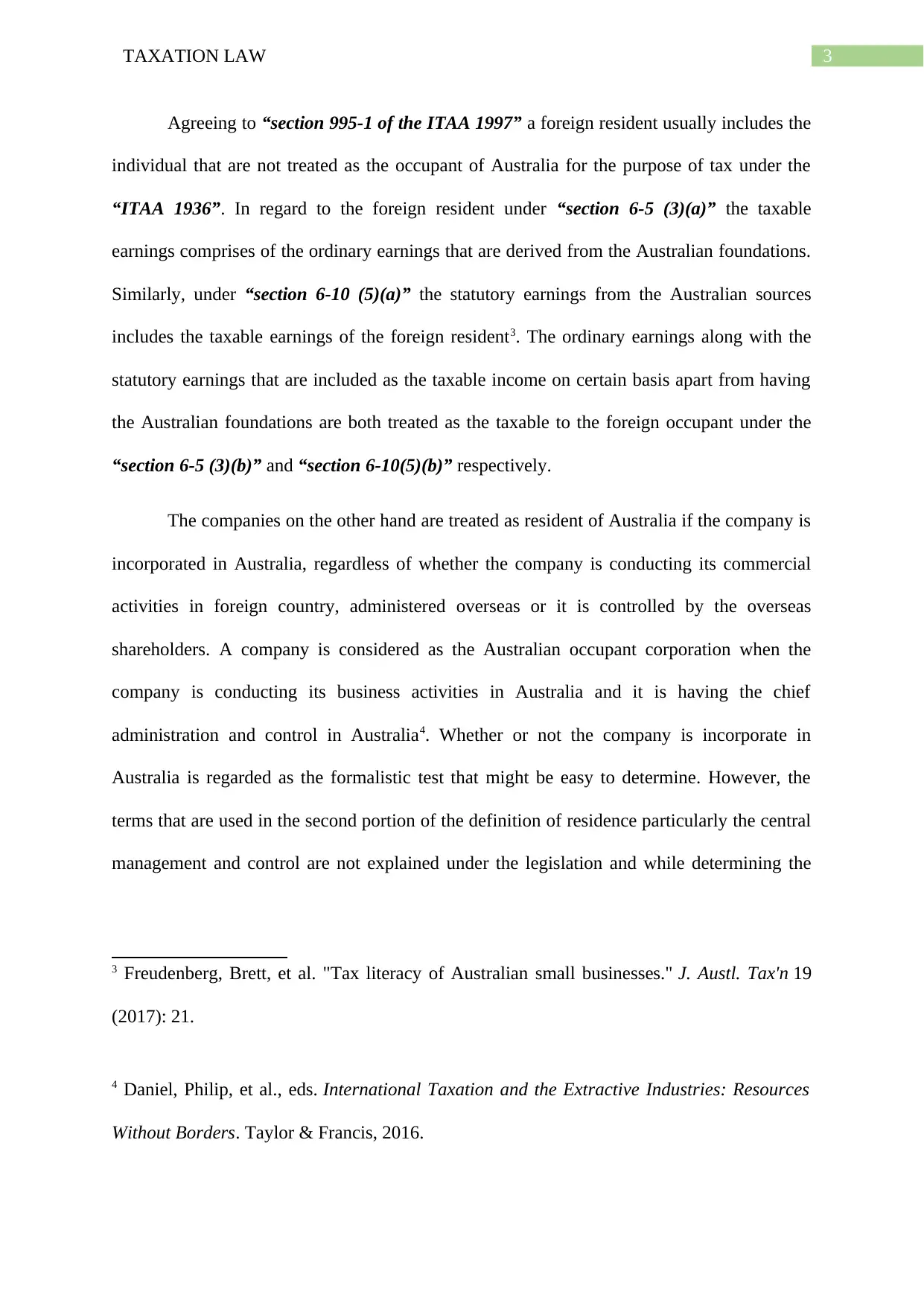
3TAXATION LAW
Agreeing to “section 995-1 of the ITAA 1997” a foreign resident usually includes the
individual that are not treated as the occupant of Australia for the purpose of tax under the
“ITAA 1936”. In regard to the foreign resident under “section 6-5 (3)(a)” the taxable
earnings comprises of the ordinary earnings that are derived from the Australian foundations.
Similarly, under “section 6-10 (5)(a)” the statutory earnings from the Australian sources
includes the taxable earnings of the foreign resident3. The ordinary earnings along with the
statutory earnings that are included as the taxable income on certain basis apart from having
the Australian foundations are both treated as the taxable to the foreign occupant under the
“section 6-5 (3)(b)” and “section 6-10(5)(b)” respectively.
The companies on the other hand are treated as resident of Australia if the company is
incorporated in Australia, regardless of whether the company is conducting its commercial
activities in foreign country, administered overseas or it is controlled by the overseas
shareholders. A company is considered as the Australian occupant corporation when the
company is conducting its business activities in Australia and it is having the chief
administration and control in Australia4. Whether or not the company is incorporate in
Australia is regarded as the formalistic test that might be easy to determine. However, the
terms that are used in the second portion of the definition of residence particularly the central
management and control are not explained under the legislation and while determining the
3 Freudenberg, Brett, et al. "Tax literacy of Australian small businesses." J. Austl. Tax'n 19
(2017): 21.
4 Daniel, Philip, et al., eds. International Taxation and the Extractive Industries: Resources
Without Borders. Taylor & Francis, 2016.
Agreeing to “section 995-1 of the ITAA 1997” a foreign resident usually includes the
individual that are not treated as the occupant of Australia for the purpose of tax under the
“ITAA 1936”. In regard to the foreign resident under “section 6-5 (3)(a)” the taxable
earnings comprises of the ordinary earnings that are derived from the Australian foundations.
Similarly, under “section 6-10 (5)(a)” the statutory earnings from the Australian sources
includes the taxable earnings of the foreign resident3. The ordinary earnings along with the
statutory earnings that are included as the taxable income on certain basis apart from having
the Australian foundations are both treated as the taxable to the foreign occupant under the
“section 6-5 (3)(b)” and “section 6-10(5)(b)” respectively.
The companies on the other hand are treated as resident of Australia if the company is
incorporated in Australia, regardless of whether the company is conducting its commercial
activities in foreign country, administered overseas or it is controlled by the overseas
shareholders. A company is considered as the Australian occupant corporation when the
company is conducting its business activities in Australia and it is having the chief
administration and control in Australia4. Whether or not the company is incorporate in
Australia is regarded as the formalistic test that might be easy to determine. However, the
terms that are used in the second portion of the definition of residence particularly the central
management and control are not explained under the legislation and while determining the
3 Freudenberg, Brett, et al. "Tax literacy of Australian small businesses." J. Austl. Tax'n 19
(2017): 21.
4 Daniel, Philip, et al., eds. International Taxation and the Extractive Industries: Resources
Without Borders. Taylor & Francis, 2016.
Secure Best Marks with AI Grader
Need help grading? Try our AI Grader for instant feedback on your assignments.
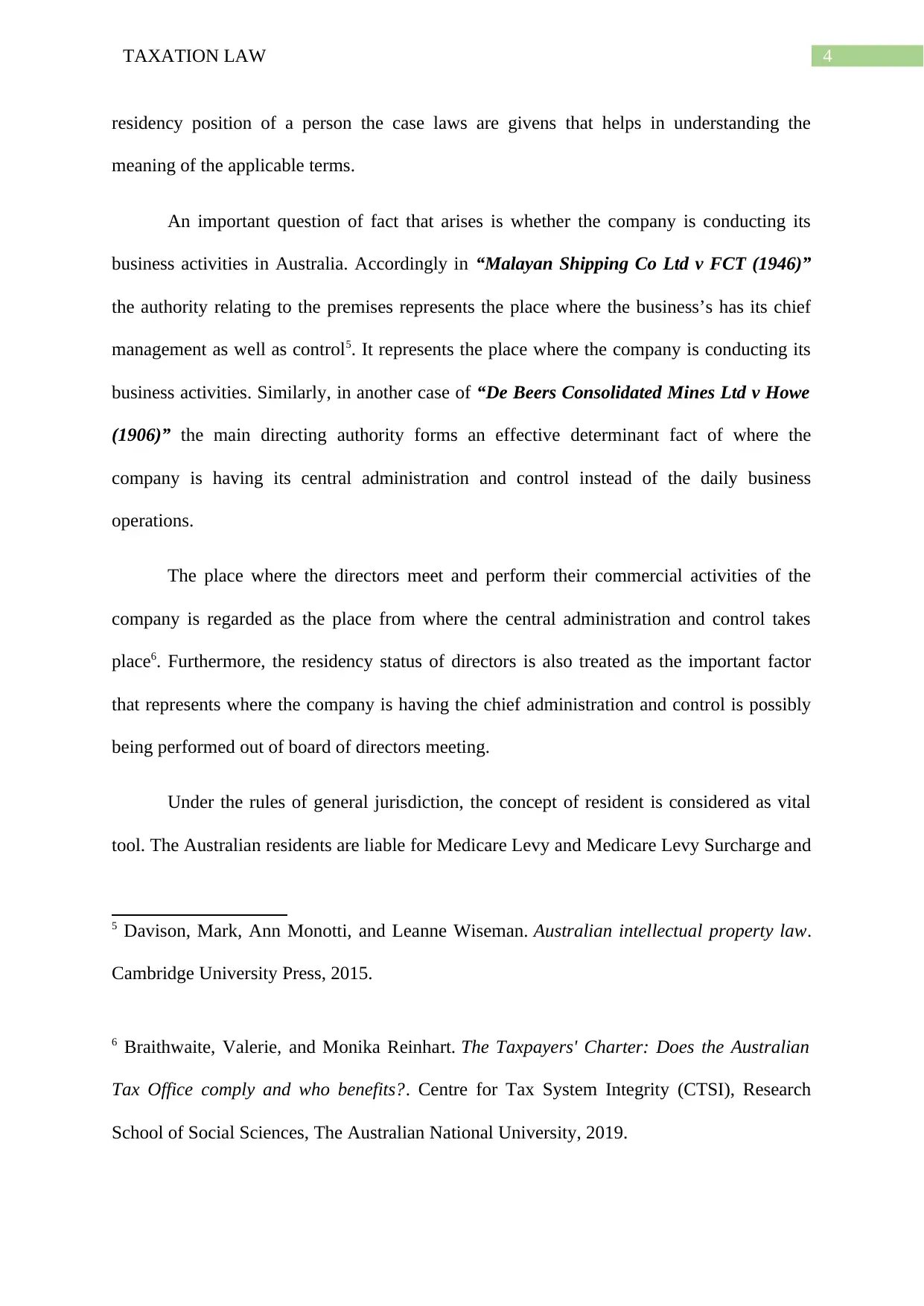
4TAXATION LAW
residency position of a person the case laws are givens that helps in understanding the
meaning of the applicable terms.
An important question of fact that arises is whether the company is conducting its
business activities in Australia. Accordingly in “Malayan Shipping Co Ltd v FCT (1946)”
the authority relating to the premises represents the place where the business’s has its chief
management as well as control5. It represents the place where the company is conducting its
business activities. Similarly, in another case of “De Beers Consolidated Mines Ltd v Howe
(1906)” the main directing authority forms an effective determinant fact of where the
company is having its central administration and control instead of the daily business
operations.
The place where the directors meet and perform their commercial activities of the
company is regarded as the place from where the central administration and control takes
place6. Furthermore, the residency status of directors is also treated as the important factor
that represents where the company is having the chief administration and control is possibly
being performed out of board of directors meeting.
Under the rules of general jurisdiction, the concept of resident is considered as vital
tool. The Australian residents are liable for Medicare Levy and Medicare Levy Surcharge and
5 Davison, Mark, Ann Monotti, and Leanne Wiseman. Australian intellectual property law.
Cambridge University Press, 2015.
6 Braithwaite, Valerie, and Monika Reinhart. The Taxpayers' Charter: Does the Australian
Tax Office comply and who benefits?. Centre for Tax System Integrity (CTSI), Research
School of Social Sciences, The Australian National University, 2019.
residency position of a person the case laws are givens that helps in understanding the
meaning of the applicable terms.
An important question of fact that arises is whether the company is conducting its
business activities in Australia. Accordingly in “Malayan Shipping Co Ltd v FCT (1946)”
the authority relating to the premises represents the place where the business’s has its chief
management as well as control5. It represents the place where the company is conducting its
business activities. Similarly, in another case of “De Beers Consolidated Mines Ltd v Howe
(1906)” the main directing authority forms an effective determinant fact of where the
company is having its central administration and control instead of the daily business
operations.
The place where the directors meet and perform their commercial activities of the
company is regarded as the place from where the central administration and control takes
place6. Furthermore, the residency status of directors is also treated as the important factor
that represents where the company is having the chief administration and control is possibly
being performed out of board of directors meeting.
Under the rules of general jurisdiction, the concept of resident is considered as vital
tool. The Australian residents are liable for Medicare Levy and Medicare Levy Surcharge and
5 Davison, Mark, Ann Monotti, and Leanne Wiseman. Australian intellectual property law.
Cambridge University Press, 2015.
6 Braithwaite, Valerie, and Monika Reinhart. The Taxpayers' Charter: Does the Australian
Tax Office comply and who benefits?. Centre for Tax System Integrity (CTSI), Research
School of Social Sciences, The Australian National University, 2019.
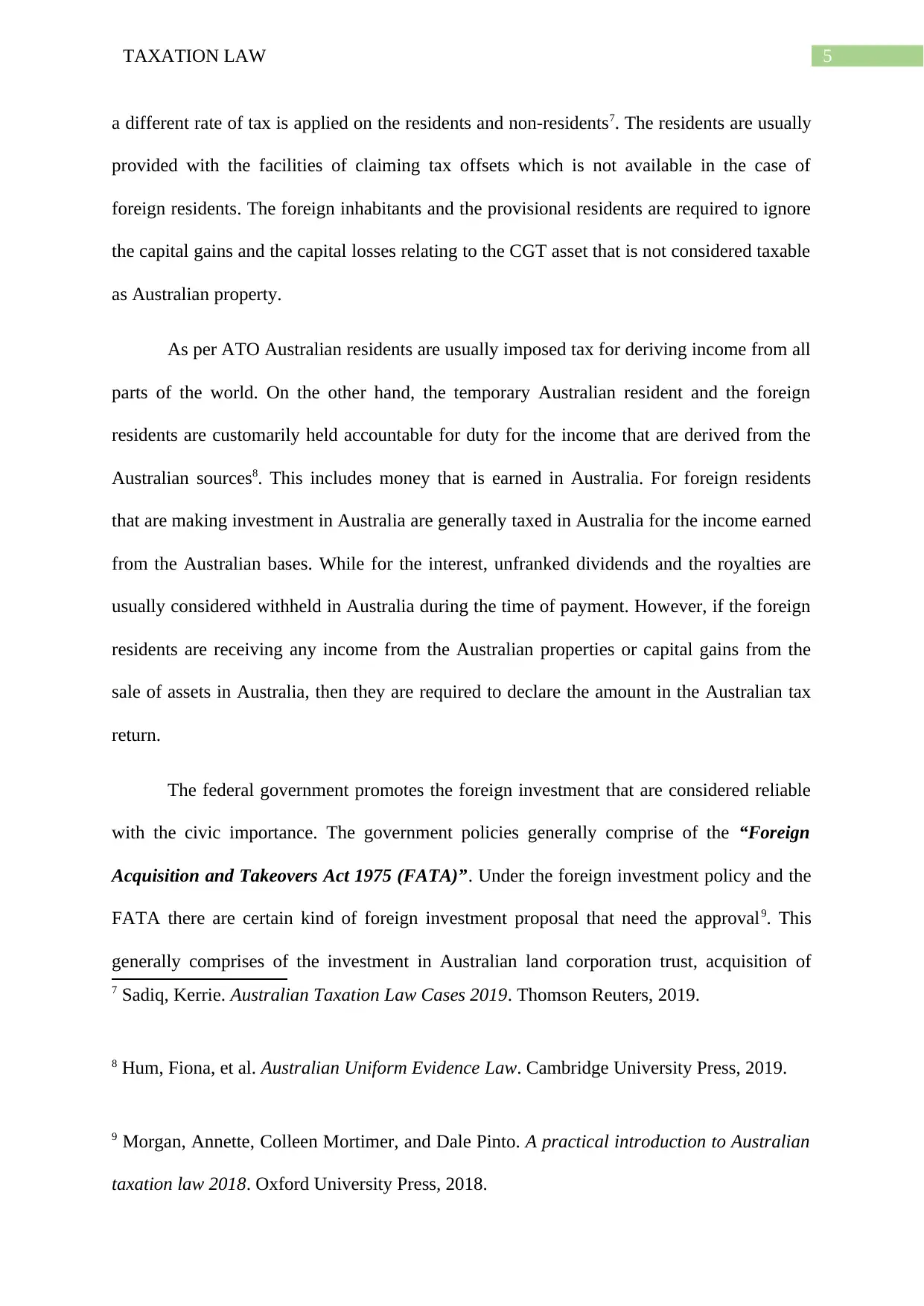
5TAXATION LAW
a different rate of tax is applied on the residents and non-residents7. The residents are usually
provided with the facilities of claiming tax offsets which is not available in the case of
foreign residents. The foreign inhabitants and the provisional residents are required to ignore
the capital gains and the capital losses relating to the CGT asset that is not considered taxable
as Australian property.
As per ATO Australian residents are usually imposed tax for deriving income from all
parts of the world. On the other hand, the temporary Australian resident and the foreign
residents are customarily held accountable for duty for the income that are derived from the
Australian sources8. This includes money that is earned in Australia. For foreign residents
that are making investment in Australia are generally taxed in Australia for the income earned
from the Australian bases. While for the interest, unfranked dividends and the royalties are
usually considered withheld in Australia during the time of payment. However, if the foreign
residents are receiving any income from the Australian properties or capital gains from the
sale of assets in Australia, then they are required to declare the amount in the Australian tax
return.
The federal government promotes the foreign investment that are considered reliable
with the civic importance. The government policies generally comprise of the “Foreign
Acquisition and Takeovers Act 1975 (FATA)”. Under the foreign investment policy and the
FATA there are certain kind of foreign investment proposal that need the approval9. This
generally comprises of the investment in Australian land corporation trust, acquisition of
7 Sadiq, Kerrie. Australian Taxation Law Cases 2019. Thomson Reuters, 2019.
8 Hum, Fiona, et al. Australian Uniform Evidence Law. Cambridge University Press, 2019.
9 Morgan, Annette, Colleen Mortimer, and Dale Pinto. A practical introduction to Australian
taxation law 2018. Oxford University Press, 2018.
a different rate of tax is applied on the residents and non-residents7. The residents are usually
provided with the facilities of claiming tax offsets which is not available in the case of
foreign residents. The foreign inhabitants and the provisional residents are required to ignore
the capital gains and the capital losses relating to the CGT asset that is not considered taxable
as Australian property.
As per ATO Australian residents are usually imposed tax for deriving income from all
parts of the world. On the other hand, the temporary Australian resident and the foreign
residents are customarily held accountable for duty for the income that are derived from the
Australian sources8. This includes money that is earned in Australia. For foreign residents
that are making investment in Australia are generally taxed in Australia for the income earned
from the Australian bases. While for the interest, unfranked dividends and the royalties are
usually considered withheld in Australia during the time of payment. However, if the foreign
residents are receiving any income from the Australian properties or capital gains from the
sale of assets in Australia, then they are required to declare the amount in the Australian tax
return.
The federal government promotes the foreign investment that are considered reliable
with the civic importance. The government policies generally comprise of the “Foreign
Acquisition and Takeovers Act 1975 (FATA)”. Under the foreign investment policy and the
FATA there are certain kind of foreign investment proposal that need the approval9. This
generally comprises of the investment in Australian land corporation trust, acquisition of
7 Sadiq, Kerrie. Australian Taxation Law Cases 2019. Thomson Reuters, 2019.
8 Hum, Fiona, et al. Australian Uniform Evidence Law. Cambridge University Press, 2019.
9 Morgan, Annette, Colleen Mortimer, and Dale Pinto. A practical introduction to Australian
taxation law 2018. Oxford University Press, 2018.
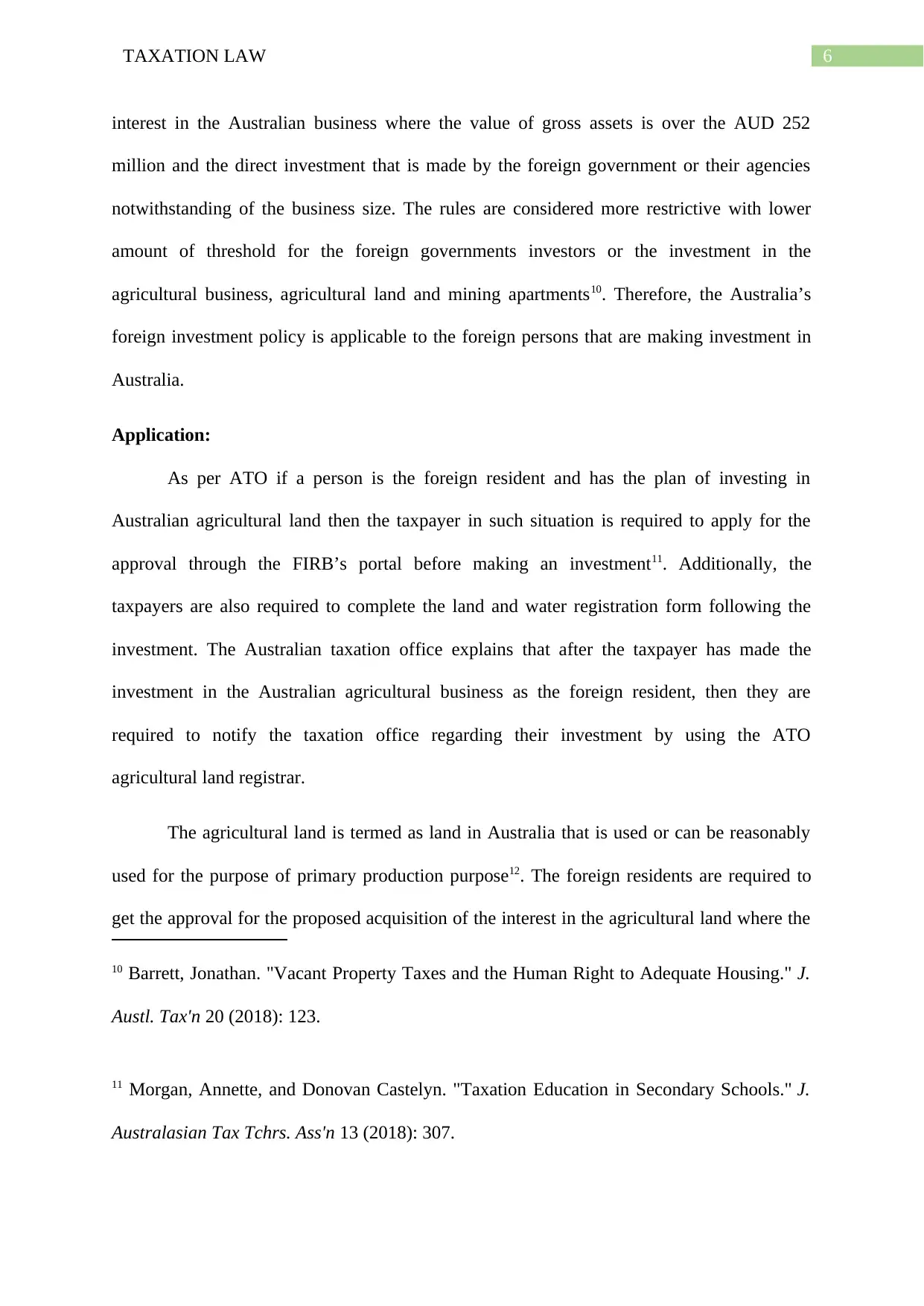
6TAXATION LAW
interest in the Australian business where the value of gross assets is over the AUD 252
million and the direct investment that is made by the foreign government or their agencies
notwithstanding of the business size. The rules are considered more restrictive with lower
amount of threshold for the foreign governments investors or the investment in the
agricultural business, agricultural land and mining apartments10. Therefore, the Australia’s
foreign investment policy is applicable to the foreign persons that are making investment in
Australia.
Application:
As per ATO if a person is the foreign resident and has the plan of investing in
Australian agricultural land then the taxpayer in such situation is required to apply for the
approval through the FIRB’s portal before making an investment11. Additionally, the
taxpayers are also required to complete the land and water registration form following the
investment. The Australian taxation office explains that after the taxpayer has made the
investment in the Australian agricultural business as the foreign resident, then they are
required to notify the taxation office regarding their investment by using the ATO
agricultural land registrar.
The agricultural land is termed as land in Australia that is used or can be reasonably
used for the purpose of primary production purpose12. The foreign residents are required to
get the approval for the proposed acquisition of the interest in the agricultural land where the
10 Barrett, Jonathan. "Vacant Property Taxes and the Human Right to Adequate Housing." J.
Austl. Tax'n 20 (2018): 123.
11 Morgan, Annette, and Donovan Castelyn. "Taxation Education in Secondary Schools." J.
Australasian Tax Tchrs. Ass'n 13 (2018): 307.
interest in the Australian business where the value of gross assets is over the AUD 252
million and the direct investment that is made by the foreign government or their agencies
notwithstanding of the business size. The rules are considered more restrictive with lower
amount of threshold for the foreign governments investors or the investment in the
agricultural business, agricultural land and mining apartments10. Therefore, the Australia’s
foreign investment policy is applicable to the foreign persons that are making investment in
Australia.
Application:
As per ATO if a person is the foreign resident and has the plan of investing in
Australian agricultural land then the taxpayer in such situation is required to apply for the
approval through the FIRB’s portal before making an investment11. Additionally, the
taxpayers are also required to complete the land and water registration form following the
investment. The Australian taxation office explains that after the taxpayer has made the
investment in the Australian agricultural business as the foreign resident, then they are
required to notify the taxation office regarding their investment by using the ATO
agricultural land registrar.
The agricultural land is termed as land in Australia that is used or can be reasonably
used for the purpose of primary production purpose12. The foreign residents are required to
get the approval for the proposed acquisition of the interest in the agricultural land where the
10 Barrett, Jonathan. "Vacant Property Taxes and the Human Right to Adequate Housing." J.
Austl. Tax'n 20 (2018): 123.
11 Morgan, Annette, and Donovan Castelyn. "Taxation Education in Secondary Schools." J.
Australasian Tax Tchrs. Ass'n 13 (2018): 307.
Paraphrase This Document
Need a fresh take? Get an instant paraphrase of this document with our AI Paraphraser
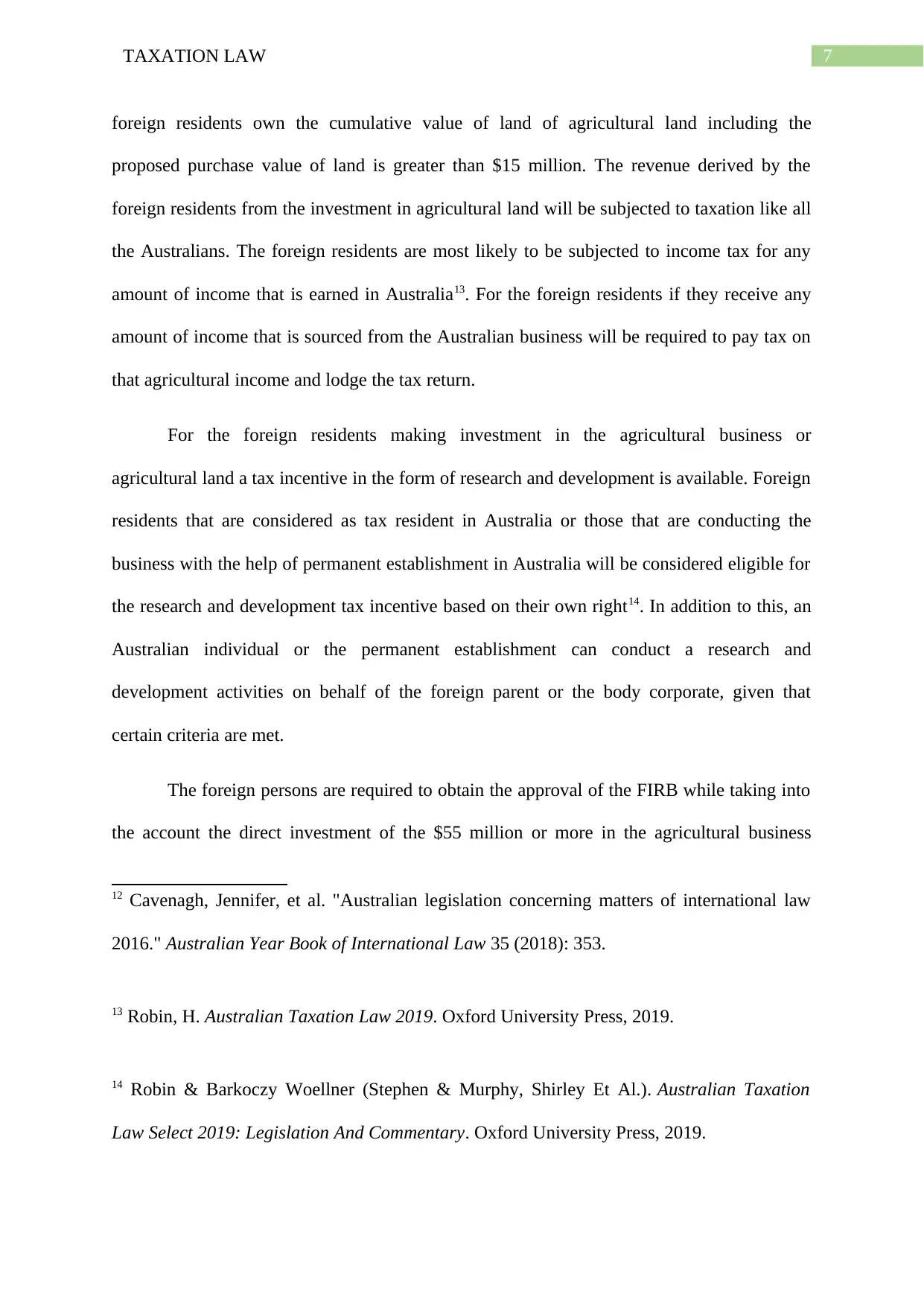
7TAXATION LAW
foreign residents own the cumulative value of land of agricultural land including the
proposed purchase value of land is greater than $15 million. The revenue derived by the
foreign residents from the investment in agricultural land will be subjected to taxation like all
the Australians. The foreign residents are most likely to be subjected to income tax for any
amount of income that is earned in Australia13. For the foreign residents if they receive any
amount of income that is sourced from the Australian business will be required to pay tax on
that agricultural income and lodge the tax return.
For the foreign residents making investment in the agricultural business or
agricultural land a tax incentive in the form of research and development is available. Foreign
residents that are considered as tax resident in Australia or those that are conducting the
business with the help of permanent establishment in Australia will be considered eligible for
the research and development tax incentive based on their own right14. In addition to this, an
Australian individual or the permanent establishment can conduct a research and
development activities on behalf of the foreign parent or the body corporate, given that
certain criteria are met.
The foreign persons are required to obtain the approval of the FIRB while taking into
the account the direct investment of the $55 million or more in the agricultural business
12 Cavenagh, Jennifer, et al. "Australian legislation concerning matters of international law
2016." Australian Year Book of International Law 35 (2018): 353.
13 Robin, H. Australian Taxation Law 2019. Oxford University Press, 2019.
14 Robin & Barkoczy Woellner (Stephen & Murphy, Shirley Et Al.). Australian Taxation
Law Select 2019: Legislation And Commentary. Oxford University Press, 2019.
foreign residents own the cumulative value of land of agricultural land including the
proposed purchase value of land is greater than $15 million. The revenue derived by the
foreign residents from the investment in agricultural land will be subjected to taxation like all
the Australians. The foreign residents are most likely to be subjected to income tax for any
amount of income that is earned in Australia13. For the foreign residents if they receive any
amount of income that is sourced from the Australian business will be required to pay tax on
that agricultural income and lodge the tax return.
For the foreign residents making investment in the agricultural business or
agricultural land a tax incentive in the form of research and development is available. Foreign
residents that are considered as tax resident in Australia or those that are conducting the
business with the help of permanent establishment in Australia will be considered eligible for
the research and development tax incentive based on their own right14. In addition to this, an
Australian individual or the permanent establishment can conduct a research and
development activities on behalf of the foreign parent or the body corporate, given that
certain criteria are met.
The foreign persons are required to obtain the approval of the FIRB while taking into
the account the direct investment of the $55 million or more in the agricultural business
12 Cavenagh, Jennifer, et al. "Australian legislation concerning matters of international law
2016." Australian Year Book of International Law 35 (2018): 353.
13 Robin, H. Australian Taxation Law 2019. Oxford University Press, 2019.
14 Robin & Barkoczy Woellner (Stephen & Murphy, Shirley Et Al.). Australian Taxation
Law Select 2019: Legislation And Commentary. Oxford University Press, 2019.
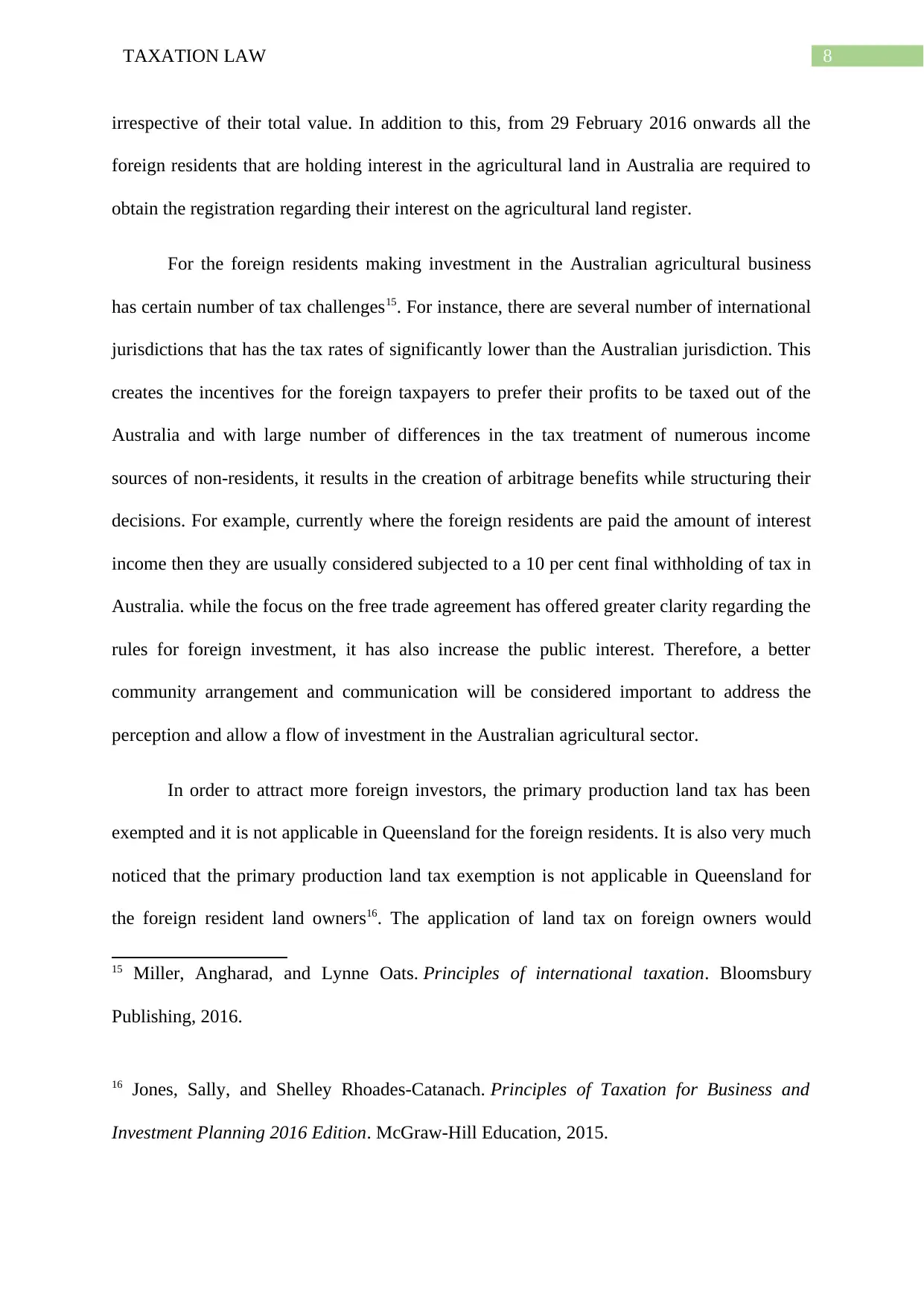
8TAXATION LAW
irrespective of their total value. In addition to this, from 29 February 2016 onwards all the
foreign residents that are holding interest in the agricultural land in Australia are required to
obtain the registration regarding their interest on the agricultural land register.
For the foreign residents making investment in the Australian agricultural business
has certain number of tax challenges15. For instance, there are several number of international
jurisdictions that has the tax rates of significantly lower than the Australian jurisdiction. This
creates the incentives for the foreign taxpayers to prefer their profits to be taxed out of the
Australia and with large number of differences in the tax treatment of numerous income
sources of non-residents, it results in the creation of arbitrage benefits while structuring their
decisions. For example, currently where the foreign residents are paid the amount of interest
income then they are usually considered subjected to a 10 per cent final withholding of tax in
Australia. while the focus on the free trade agreement has offered greater clarity regarding the
rules for foreign investment, it has also increase the public interest. Therefore, a better
community arrangement and communication will be considered important to address the
perception and allow a flow of investment in the Australian agricultural sector.
In order to attract more foreign investors, the primary production land tax has been
exempted and it is not applicable in Queensland for the foreign residents. It is also very much
noticed that the primary production land tax exemption is not applicable in Queensland for
the foreign resident land owners16. The application of land tax on foreign owners would
15 Miller, Angharad, and Lynne Oats. Principles of international taxation. Bloomsbury
Publishing, 2016.
16 Jones, Sally, and Shelley Rhoades-Catanach. Principles of Taxation for Business and
Investment Planning 2016 Edition. McGraw-Hill Education, 2015.
irrespective of their total value. In addition to this, from 29 February 2016 onwards all the
foreign residents that are holding interest in the agricultural land in Australia are required to
obtain the registration regarding their interest on the agricultural land register.
For the foreign residents making investment in the Australian agricultural business
has certain number of tax challenges15. For instance, there are several number of international
jurisdictions that has the tax rates of significantly lower than the Australian jurisdiction. This
creates the incentives for the foreign taxpayers to prefer their profits to be taxed out of the
Australia and with large number of differences in the tax treatment of numerous income
sources of non-residents, it results in the creation of arbitrage benefits while structuring their
decisions. For example, currently where the foreign residents are paid the amount of interest
income then they are usually considered subjected to a 10 per cent final withholding of tax in
Australia. while the focus on the free trade agreement has offered greater clarity regarding the
rules for foreign investment, it has also increase the public interest. Therefore, a better
community arrangement and communication will be considered important to address the
perception and allow a flow of investment in the Australian agricultural sector.
In order to attract more foreign investors, the primary production land tax has been
exempted and it is not applicable in Queensland for the foreign residents. It is also very much
noticed that the primary production land tax exemption is not applicable in Queensland for
the foreign resident land owners16. The application of land tax on foreign owners would
15 Miller, Angharad, and Lynne Oats. Principles of international taxation. Bloomsbury
Publishing, 2016.
16 Jones, Sally, and Shelley Rhoades-Catanach. Principles of Taxation for Business and
Investment Planning 2016 Edition. McGraw-Hill Education, 2015.
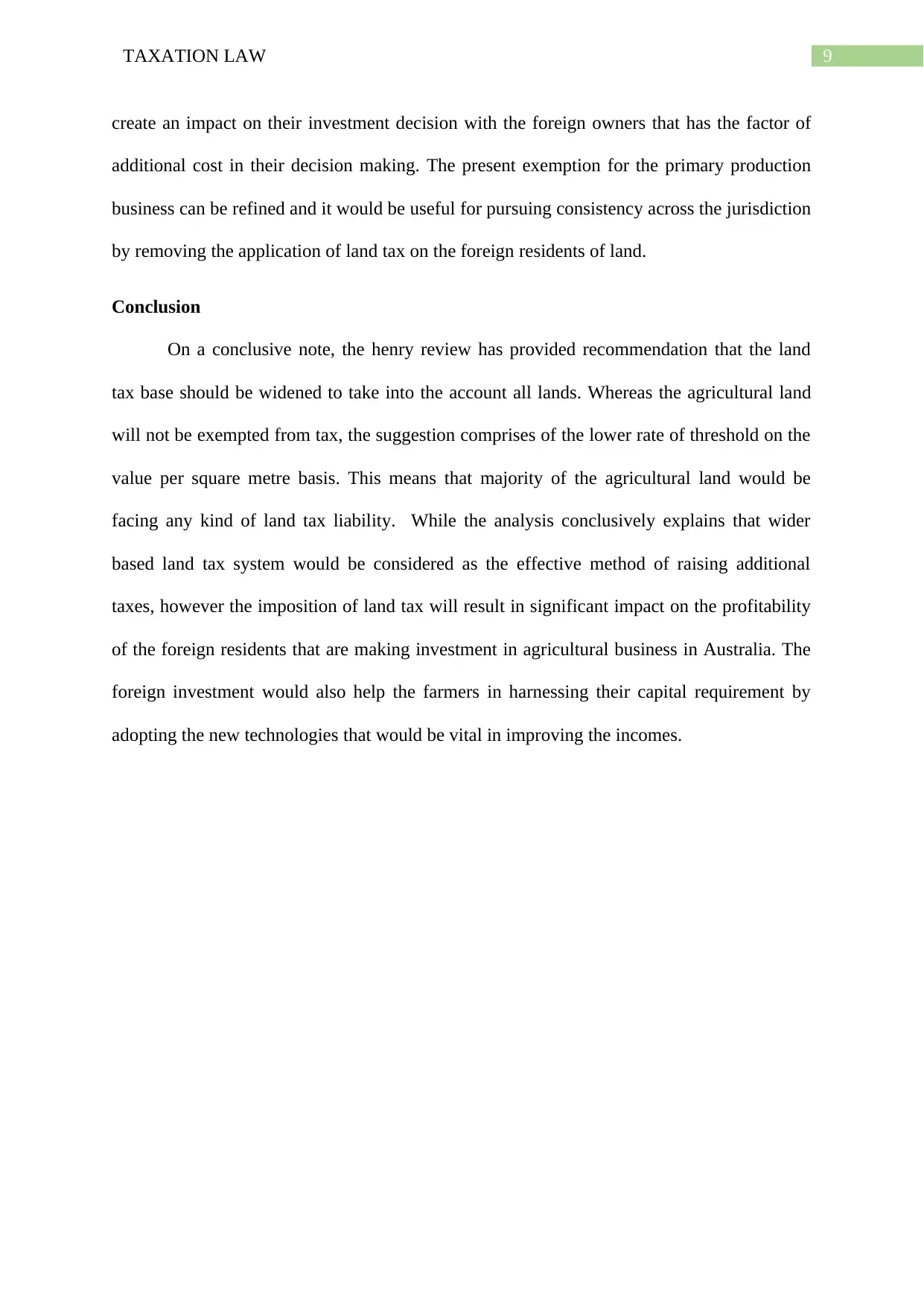
9TAXATION LAW
create an impact on their investment decision with the foreign owners that has the factor of
additional cost in their decision making. The present exemption for the primary production
business can be refined and it would be useful for pursuing consistency across the jurisdiction
by removing the application of land tax on the foreign residents of land.
Conclusion
On a conclusive note, the henry review has provided recommendation that the land
tax base should be widened to take into the account all lands. Whereas the agricultural land
will not be exempted from tax, the suggestion comprises of the lower rate of threshold on the
value per square metre basis. This means that majority of the agricultural land would be
facing any kind of land tax liability. While the analysis conclusively explains that wider
based land tax system would be considered as the effective method of raising additional
taxes, however the imposition of land tax will result in significant impact on the profitability
of the foreign residents that are making investment in agricultural business in Australia. The
foreign investment would also help the farmers in harnessing their capital requirement by
adopting the new technologies that would be vital in improving the incomes.
create an impact on their investment decision with the foreign owners that has the factor of
additional cost in their decision making. The present exemption for the primary production
business can be refined and it would be useful for pursuing consistency across the jurisdiction
by removing the application of land tax on the foreign residents of land.
Conclusion
On a conclusive note, the henry review has provided recommendation that the land
tax base should be widened to take into the account all lands. Whereas the agricultural land
will not be exempted from tax, the suggestion comprises of the lower rate of threshold on the
value per square metre basis. This means that majority of the agricultural land would be
facing any kind of land tax liability. While the analysis conclusively explains that wider
based land tax system would be considered as the effective method of raising additional
taxes, however the imposition of land tax will result in significant impact on the profitability
of the foreign residents that are making investment in agricultural business in Australia. The
foreign investment would also help the farmers in harnessing their capital requirement by
adopting the new technologies that would be vital in improving the incomes.
Secure Best Marks with AI Grader
Need help grading? Try our AI Grader for instant feedback on your assignments.
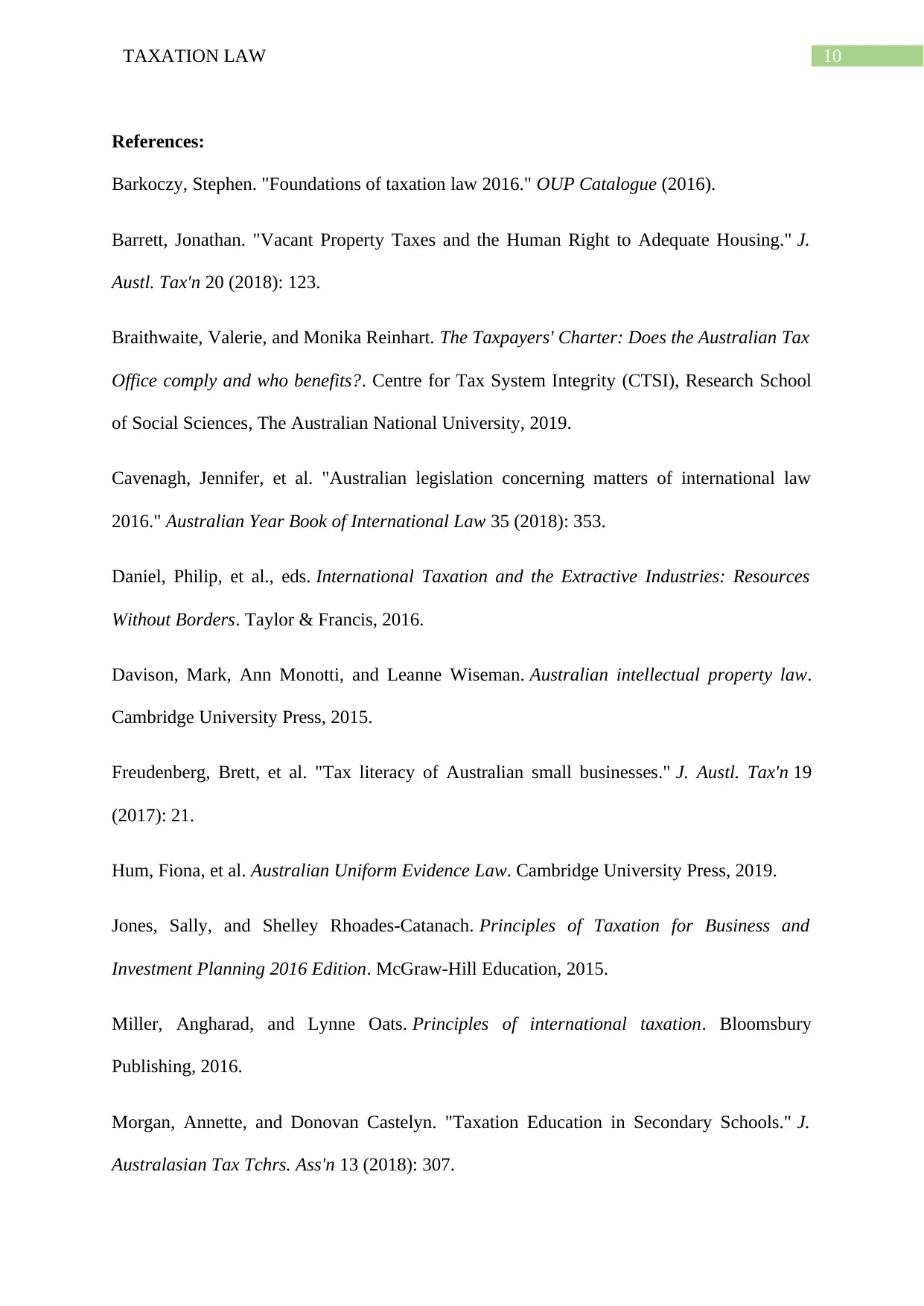
10TAXATION LAW
References:
Barkoczy, Stephen. "Foundations of taxation law 2016." OUP Catalogue (2016).
Barrett, Jonathan. "Vacant Property Taxes and the Human Right to Adequate Housing." J.
Austl. Tax'n 20 (2018): 123.
Braithwaite, Valerie, and Monika Reinhart. The Taxpayers' Charter: Does the Australian Tax
Office comply and who benefits?. Centre for Tax System Integrity (CTSI), Research School
of Social Sciences, The Australian National University, 2019.
Cavenagh, Jennifer, et al. "Australian legislation concerning matters of international law
2016." Australian Year Book of International Law 35 (2018): 353.
Daniel, Philip, et al., eds. International Taxation and the Extractive Industries: Resources
Without Borders. Taylor & Francis, 2016.
Davison, Mark, Ann Monotti, and Leanne Wiseman. Australian intellectual property law.
Cambridge University Press, 2015.
Freudenberg, Brett, et al. "Tax literacy of Australian small businesses." J. Austl. Tax'n 19
(2017): 21.
Hum, Fiona, et al. Australian Uniform Evidence Law. Cambridge University Press, 2019.
Jones, Sally, and Shelley Rhoades-Catanach. Principles of Taxation for Business and
Investment Planning 2016 Edition. McGraw-Hill Education, 2015.
Miller, Angharad, and Lynne Oats. Principles of international taxation. Bloomsbury
Publishing, 2016.
Morgan, Annette, and Donovan Castelyn. "Taxation Education in Secondary Schools." J.
Australasian Tax Tchrs. Ass'n 13 (2018): 307.
References:
Barkoczy, Stephen. "Foundations of taxation law 2016." OUP Catalogue (2016).
Barrett, Jonathan. "Vacant Property Taxes and the Human Right to Adequate Housing." J.
Austl. Tax'n 20 (2018): 123.
Braithwaite, Valerie, and Monika Reinhart. The Taxpayers' Charter: Does the Australian Tax
Office comply and who benefits?. Centre for Tax System Integrity (CTSI), Research School
of Social Sciences, The Australian National University, 2019.
Cavenagh, Jennifer, et al. "Australian legislation concerning matters of international law
2016." Australian Year Book of International Law 35 (2018): 353.
Daniel, Philip, et al., eds. International Taxation and the Extractive Industries: Resources
Without Borders. Taylor & Francis, 2016.
Davison, Mark, Ann Monotti, and Leanne Wiseman. Australian intellectual property law.
Cambridge University Press, 2015.
Freudenberg, Brett, et al. "Tax literacy of Australian small businesses." J. Austl. Tax'n 19
(2017): 21.
Hum, Fiona, et al. Australian Uniform Evidence Law. Cambridge University Press, 2019.
Jones, Sally, and Shelley Rhoades-Catanach. Principles of Taxation for Business and
Investment Planning 2016 Edition. McGraw-Hill Education, 2015.
Miller, Angharad, and Lynne Oats. Principles of international taxation. Bloomsbury
Publishing, 2016.
Morgan, Annette, and Donovan Castelyn. "Taxation Education in Secondary Schools." J.
Australasian Tax Tchrs. Ass'n 13 (2018): 307.
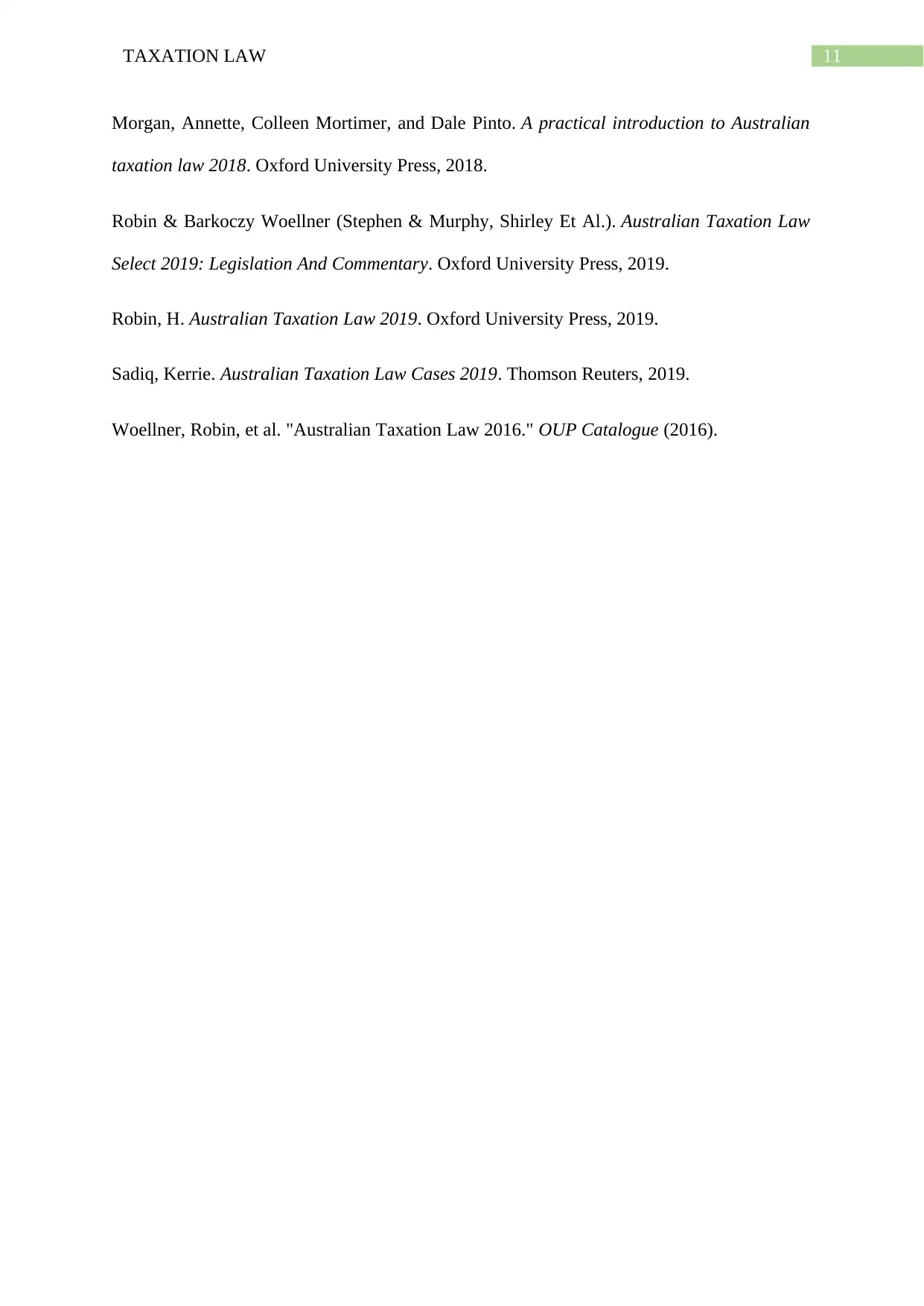
11TAXATION LAW
Morgan, Annette, Colleen Mortimer, and Dale Pinto. A practical introduction to Australian
taxation law 2018. Oxford University Press, 2018.
Robin & Barkoczy Woellner (Stephen & Murphy, Shirley Et Al.). Australian Taxation Law
Select 2019: Legislation And Commentary. Oxford University Press, 2019.
Robin, H. Australian Taxation Law 2019. Oxford University Press, 2019.
Sadiq, Kerrie. Australian Taxation Law Cases 2019. Thomson Reuters, 2019.
Woellner, Robin, et al. "Australian Taxation Law 2016." OUP Catalogue (2016).
Morgan, Annette, Colleen Mortimer, and Dale Pinto. A practical introduction to Australian
taxation law 2018. Oxford University Press, 2018.
Robin & Barkoczy Woellner (Stephen & Murphy, Shirley Et Al.). Australian Taxation Law
Select 2019: Legislation And Commentary. Oxford University Press, 2019.
Robin, H. Australian Taxation Law 2019. Oxford University Press, 2019.
Sadiq, Kerrie. Australian Taxation Law Cases 2019. Thomson Reuters, 2019.
Woellner, Robin, et al. "Australian Taxation Law 2016." OUP Catalogue (2016).
1 out of 12
Related Documents
Your All-in-One AI-Powered Toolkit for Academic Success.
+13062052269
info@desklib.com
Available 24*7 on WhatsApp / Email
![[object Object]](/_next/static/media/star-bottom.7253800d.svg)
Unlock your academic potential
© 2024 | Zucol Services PVT LTD | All rights reserved.





